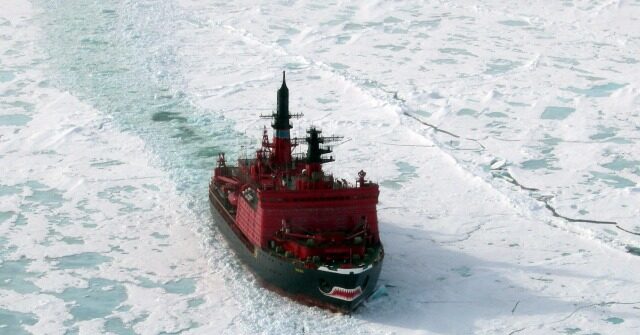Russian tankers that would normally carry oil to European customers are instead being rerouted through the Arctic to China, according to an OilPrice report Friday.
“Russia sent two initial crude oil shipments to China in mid-July, with four more oil tankers currently headed the same way via the Arctic, each carrying around 750,000 barrels of crude oil,” the report said.
The Arctic Ocean Northern Sea Route (NSR) is about 30 percent faster for Russian shipments to Asia than the Suez Canal route. The Russians have been contemplating a switch to the NSR for some time, and the Nordic nations have been exploring it as well.
When Europe and the United States imposed sanctions after Russia invaded Ukraine and Europe began what appears to be a permanent move away from depending on Russian oil and gas, the NSR route became more attractive to Moscow.
Interest in Arctic shipping also picked up after the MV Ever Given disaster in March 2021, when a massive cargo ship got stuck in the Suez Canal and blocked a great deal of international shipping for several days. Chinese and Russian officials argued that opening another major trade route for nations with access to the Arctic would reduce dependence on the Suez and provide alternatives in the case of another blockage.
Of course, shipping through the Arctic poses some unique challenges. Analysts told OilPrice that Russia has been building up its fleet of ice-class tankers, and some Russian firms are in a position to switch almost all of their shipping to the NSR.
Nikkei Asia offered a lavishly illustrated and animated argument that the NSR could be a game changer for shipping between Asia and Europe, especially now that global warming has purportedly melted enough Arctic ice to make the waterway easier to navigate.
“The route is also easier to navigate as it does not pass through the politically volatile Middle East, and there are no pirate attacks,” Nikkei Asia noted. “However, it is expensive. The route comes with additional costs, like hiring the services of Russian icebreakers and building ships with special specifications.”
Of course, there are concerns about the environmental impact of heavy shipping through the Arctic, but advocates argue that the shorter shipping distances made possible by the NSR mean huge ships will burn less fuel, creating a distinct environmental advantage.
Moscow certainly likes the sound of that “hiring the services of Russian icebreakers” point Nikkei Asia made, and if the NSR becomes heavily traveled, Russia would also gain a commanding strategic position in international trade.
At a 2019 conference in Beijing, Russian leader Vladimir Putin touted the idea of linking the NSR to China’s Belt and Road Initiative (BRI), giving China a shorter and strategically reliable shipping route to Europe. Since Japan and South Korea could also benefit from the NSR, this could eventually bring a great deal of the world’s shipping under the strategic control of Beijing and Moscow.


